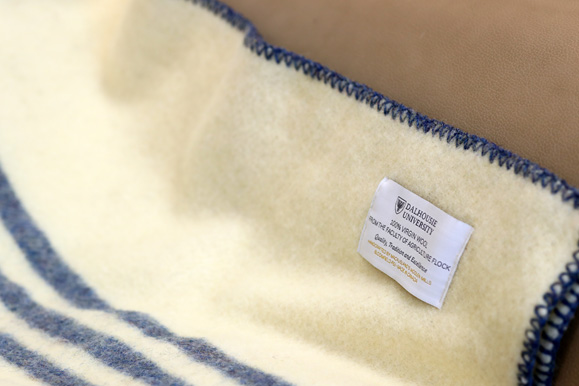Faculty of Agriculture Wool blankets produced from fleece of campus flock.
The Faculty of Agriculture prides itself on providing students with hands-on learning opportunities while encompassing the full view of agriculture from field to fork.Ģż However, one student took this a step further and embarked on what has become a Faculty of Agriculture tradition.
Gary Wallace spent 26 years as the former NSAC ās Shepherd and was looking to identify alternative uses for raw wool. The idea began at a time when raw wool prices in Nova Scotia were very low and ideas were needed to enhance income generation for the producer community.
āThe cost of shearing sheep was even more than the return from the raw wool produced,ā Gary explained.Ģż āThe sheep had to be sheared, of course, but at the time many sheep farmers were just storing it on their farms or actually dumping the wool in the landfill to avoid the extra costs of trucking to wool pick-up points.ā
 With MacAusland's Woollen Mills close by in Prince Edward Island, Gary and others began shipping high quality raw wool to the Island for processing.Ģż However, with limited market capacity, there was more wool than the Mills required.
With MacAusland's Woollen Mills close by in Prince Edward Island, Gary and others began shipping high quality raw wool to the Island for processing.Ģż However, with limited market capacity, there was more wool than the Mills required.
āWe then thought, why not make and sell our own blankets,ā said Gary.
The Faculty now produces wool blankets utilizing the wool from the campus flock.Ģż Students learn how to shear the sheep each spring and clean the fleece and as demand requires, the wool is delivered to MacAusland Woollen Mills in Prince Edward Island for processing on behalf of the university. The finished blankets are used primarily for gifts with a limited quantity available for sale among faculty, staff, students and alumni.Ģż
Raw wool prices continue to be low today and alternative uses and ideas such as utilizing wool as insulation as well as compost and mulch remain.ĢżĢż
The Faculty of Agriculture is undertaking research into the feasibility of using wool as insulation as about 50 per cent of raw wool being produced in the region is either being landfilled, stored or stockpiled or thrown away. This represents a serious under-utilization of a valuable product.
Gary graduated with his degree in Economics and Agricultural Business in 2005 and eventually earned his Master of Adult Education from St. Francis Xavier in 2009.Ģż
āI completed my Bachelor of Science degree over six years balancing work and study,ā Gary added. āI often showed up to class in my coveralls having just delivered triplets.ā
Ģż
Ģż
Recent News
- Engineering banquet brings students, faculty together in celebration of community
- Engineering Excellence: Students triumph at Atlantic competition, earn National silver
- Dal AC International expands global learning with GSO funding
- Engaging with the African Nova Scotian Community
- The Dal AC International Guest House is Now Open!
- Finding Balance and Success in Engineering and Athletics
- International conference on Canadian agriāfood & rural advisory, extension and education
- BCDI Canadian International Development Scholarships
